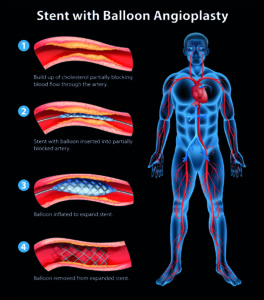
Percutaneous Coronary Intervention (PCI)
Percutaneous coronary intervention (PCI) is a general term given to the process of restoring blood flow in blocked arteries. Blockages in the arteries are a serious condition that can cause a heart attack or stroke, and PCI is another specialty in which Dr. Ginkel has advanced training.
There are a variety of methods used during percutaneous coronary intervention, of which the most common is a stent – a mesh material that resembles a netted cylinder mounted on a balloon. The stent is placed into the blocked artery to open the narrow space and allow blood to flow without obstruction.
How do Arteries Become Blocked, and What Causes the Occlusion?
Occlusions are narrowed segments in the arteries caused by the buildup of cholesterol that forms in between the thin layers of the artery. Once enough cholesterol builds up, the tissue (or “plaque”) will rupture, and the body naturally tries to control the damage by forming a clot over the rupture. This area of clot may progress to block the entire artery, inducing a heart attack, or it may stabilize and scar over, which creates a partial blockage. The more resistance the blood encounters pumping blood to the heart, the less oxygen is delivered to the heart muscle, and the harder the heart has to work.
The Percutaneous Coronary Intervention Procedure
Dr. Ginkel performs PCI by threading a balloon (or stent) into the artery of the heart in which the blockage has occurred. The stent is placed on a balloon tipped catheter, which is passed through either the femoral artery or radial artery, and up through blood vessels until it reaches the site of the blockage in the heart. During this procedure, we use contrast dye visible through x-rays to provide a detailed image of the heart and act as a guide for the stent placement. The balloon containing the stent is then inflated, depositing the stent at the specific location of the blockage. The stent acts as infrastructure to keep the area of blockage open and restore normal blood flow to the heart. Cardiac interventions using stents help reduce pressure on the heart as a result of cholesterol plaque, and open the route for consistent flow.
How long will the stent last?
Once a stent is implanted, it’s made to last throughout your lifetime. Depending on the material used to create the stent, some stents are coated with a dissolvable material that releases a drug that reduces the chance of re-narrowing, commonly known as restenosis, at the stented segment. These are known as Drug Eluding Stents (DES). Although DES reduce restenosis, they require prolonged treatment with blood thinning antiplatelet medications. DES have been shown to be most effective in vessels that are small in size or diffusely diseased. Certain medical conditions, such as a history of bleeding ulcers, may preclude prolonged antiplatelet treatment and thus DES. Dr. Ginkel will tell you what type of stent will be used for your PCI procedure, as well as providing you with information about that particular stent so that you are well-versed on the device going into your body.
Once this procedure is complete, you will have regular follow-up appointments at Midcoast Cardiovascular Associates, and additional supporting medications may be prescribed. Make an appointment for your cardiovascular consultation today by calling 805-354-0112.
Recent Comments